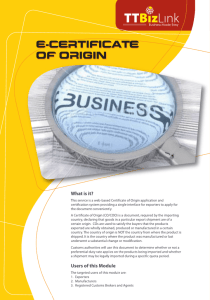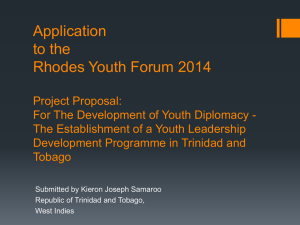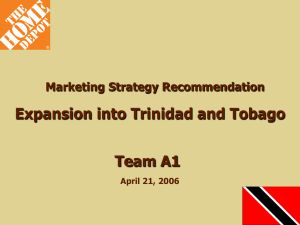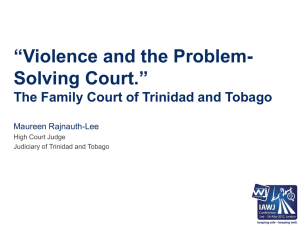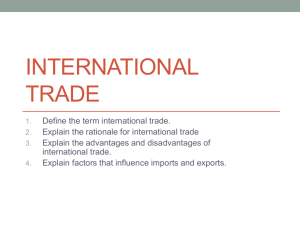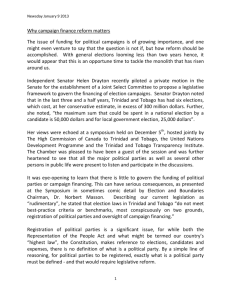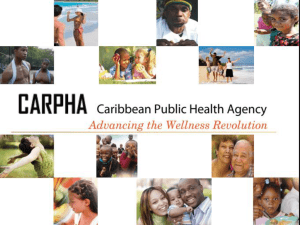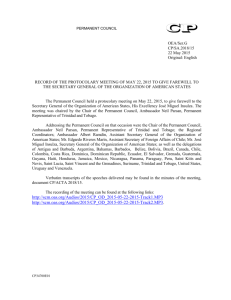II. TRADE AND INVESTMENT
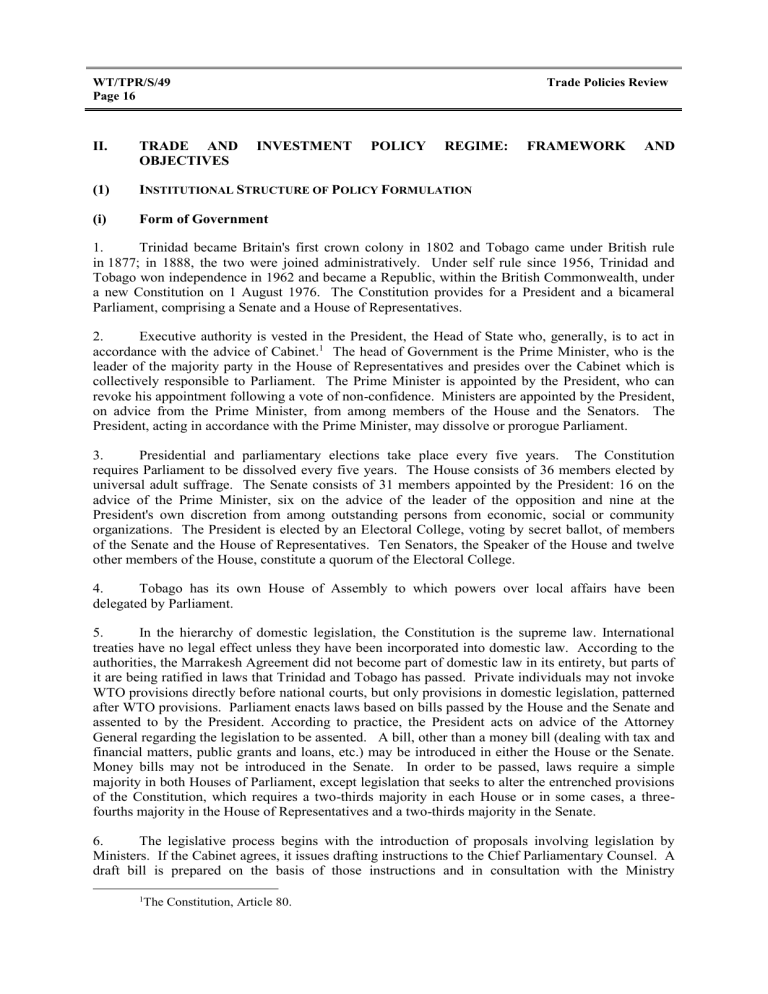
WT/TPR/S/49
Page 16
II.
TRADE AND
OBJECTIVES
INVESTMENT POLICY REGIME:
Trade Policies Review
FRAMEWORK AND
(1) I NSTITUTIONAL S TRUCTURE OF P OLICY F ORMULATION
(i) Form of Government
1.
Trinidad became Britain's first crown colony in 1802 and Tobago came under British rule in 1877; in 1888, the two were joined administratively. Under self rule since 1956, Trinidad and
Tobago won independence in 1962 and became a Republic, within the British Commonwealth, under a new Constitution on 1 August 1976. The Constitution provides for a President and a bicameral
Parliament, comprising a Senate and a House of Representatives.
2.
Executive authority is vested in the President, the Head of State who, generally, is to act in accordance with the advice of Cabinet.
1 The head of Government is the Prime Minister, who is the leader of the majority party in the House of Representatives and presides over the Cabinet which is collectively responsible to Parliament. The Prime Minister is appointed by the President, who can revoke his appointment following a vote of non-confidence. Ministers are appointed by the President, on advice from the Prime Minister, from among members of the House and the Senators. The
President, acting in accordance with the Prime Minister, may dissolve or prorogue Parliament.
3.
Presidential and parliamentary elections take place every five years. The Constitution requires Parliament to be dissolved every five years. The House consists of 36 members elected by universal adult suffrage. The Senate consists of 31 members appointed by the President: 16 on the advice of the Prime Minister, six on the advice of the leader of the opposition and nine at the
President's own discretion from among outstanding persons from economic, social or community organizations. The President is elected by an Electoral College, voting by secret ballot, of members of the Senate and the House of Representatives. Ten Senators, the Speaker of the House and twelve other members of the House, constitute a quorum of the Electoral College.
4.
Tobago has its own House of Assembly to which powers over local affairs have been delegated by Parliament.
5.
In the hierarchy of domestic legislation, the Constitution is the supreme law. International treaties have no legal effect unless they have been incorporated into domestic law. According to the authorities, the Marrakesh Agreement did not become part of domestic law in its entirety, but parts of it are being ratified in laws that Trinidad and Tobago has passed. Private individuals may not invoke
WTO provisions directly before national courts, but only provisions in domestic legislation, patterned after WTO provisions. Parliament enacts laws based on bills passed by the House and the Senate and assented to by the President. According to practice, the President acts on advice of the Attorney
General regarding the legislation to be assented. A bill, other than a money bill (dealing with tax and financial matters, public grants and loans, etc.) may be introduced in either the House or the Senate.
Money bills may not be introduced in the Senate. In order to be passed, laws require a simple majority in both Houses of Parliament, except legislation that seeks to alter the entrenched provisions of the Constitution, which requires a two-thirds majority in each House or in some cases, a threefourths majority in the House of Representatives and a two-thirds majority in the Senate.
6.
The legislative process begins with the introduction of proposals involving legislation by
Ministers. If the Cabinet agrees, it issues drafting instructions to the Chief Parliamentary Counsel. A draft bill is prepared on the basis of those instructions and in consultation with the Ministry
1 The Constitution, Article 80.
Trinidad and Tobago WT/TPR/S/49
Page 17 concerned. It is then reviewed by the Legislation Review Committee of the Attorney General's
Ministry to ascertain whether it is in a suitable form for presentation to Parliament. Once the bill is introduced in Parliament it undergoes two readings. As soon as the bill has gone through all its stages in both Houses, it must be submitted to the President for his assent. A bill does not become law until the President has assented thereto, and does not have effect until it is proclaimed by the President.
7.
The judicial system, whose independence is guaranteed by the Constitution, is similar to that of the United Kingdom, with a High Court and Appeal Court. Final appeal is to the Judicial
Committee of the Privy Council, a group of judges from Commonwealth countries, which sits in
London.
(ii) Policy-making and administration
8.
The Ministry of Trade and Industry is in charge of trade policy matters, including negotiating trade agreements and approving import licensing applications (Table II.1). The Ministry also approves activities accorded incentives, including duty concessions, which are subject to legislative approval. However, under the Fiscal Incentives Act, the President may, by order, declare a product an approved product or an enterprise an approved enterprise. The Ministry is currently being reorganized and will create an International/Hemispheric and Regional Trade Unit which will be responsible for trade policy formulation, implementation and review, participation in multilateral fora such as the WTO, negotiations of bilateral and regional agreements, and CARICOM issues.
9.
The Tourism and Industrial Development Company of Trinidad and Tobago, Ltd. (TIDCO), established in 1995 in the portfolio of the Minister of Trade and Industry, has a number of traderelated responsibilities. The Division of Trade and Industry is, inter alia , involved in trade negotiations, the analysis of trade agreements, and the promotion of export activities of local manufacturers. Its Certification Department is the certifying body for various regional trade agreements facilitating concessions to exporters. The Government Policy and Special Projects
Division is responsible for promoting the implementation of relevant government policy through legal, regulatory, informational and institutional reforms.
10.
The Government or the private sector may propose changes to the tariff structure but the
Cabinet is the final arbiter for introducing such changes. According to the Customs Act, Parliament may impose import and export duties. The Department of Customs and Excise, within the Ministry of
Finance, handles such matters as duty collection, the imposition of surcharges, duty concessions and export rebates; it also issues certificates of origin for exports under various preference schemes, including the Generalized System of Preference, and the Caribbean Basin Initiative.
11.
The registration of patents, trademarks and industrial design is administered by the
Intellectual Property Registry of the Registrar General who reports to the Attorney General within the
Ministry of Legal Affairs.
12.
The Cabinet Sub-Committee, headed by the Minister of Energy and Energy Industries, comprises also the Ministers of Finance, Planning and Development, Trade, Industry and Consumer
Affairs, Foreign Affairs and Public Utilities to take decisions in respect of the energy industry. A
Fiscal Incentives Committee has recently been set up, as mandated by the Energy Sub-Committee, to evaluate the costs of the incentives and analyse the extent to which concessions are necessary.
13.
In December 1997, the Cabinet agreed to the establishment under the responsibility of the
Ministry of Trade and Industry of a Technical Coordinating Committee (TCC) and supporting sub-committees on access, competition policy, intellectual property rights, etc. The function of the
TCC is to ensure that Trinidad and Tobago's position in the various negotiations is informed by
WT/TPR/S/49
Page 18
Trade Policies Review government policies. The responsibility of the specialist sub-committees is to provide advice to the
TCC on functional subject areas.
Table II.1
Government agencies involved in the formulation or administration of trade or trade-related policies and area of responsibility
Agencies Responsibility
Ministry of Finance
Controller of Customs
Ministry of Agriculture
Ministry of Trade and Industry
Double taxation agreements
Changes to the Common External Tariff (CET)
Administration of rules of origin and procedures
Administration of the Common External Tariff
Plant and animal quarantine
Sanitary and phytosanitary measures
Formulation of trade policies
Negotiation of free-trade agreements
Co-ordination of trade in services
Administration of anti-dumping and countervailing duties
Bilateral Investment Treaty
Administration of competition policy
Tourism & Industrial Development Company Limited (TIDCO) Implementation of trade and investment policy
Trinidad and Tobago Bureau of Standards (TTBS)
Administration of certificates of origin
Implementation and development of standards
Ministry of Legal Affairs
Intellectual Property Office
Administration of intellectual property (patents, trademarks, etc.)
Drafting of legislation and agreements
Office of the Attorney General
Chief Parliamentary Council
Ministry of Planning
Ministry of Works
(Standing Committee on Air Services Agreement)
Environmental impact assessment
Co-ordination of overall economic policy framework
Air services agreements
Office of the Prime Minister
Telecommunications Division
Ministry of Health
Food and Drug Division
Telecommunications Agreement
Negotiations related to telecommunication services
Food and drug certification
Source: Information provided by the authorities of Trinidad and Tobago.
(iii) Advisory and review bodies
14.
The Government has appointed a Standing Advisory Committee on Trade and Related
Matters. This Committee comprises representatives of the major private sector bodies, the Trinidad and Tobago Manufacturers' Association, Chambers of Commerce, the University of the West Indies and representatives of the labour movement. This Committee meets at least once a month.
Trinidad and Tobago
(iv) Trade laws and regulations
WT/TPR/S/49
Page 19
15.
The main legislation affecting trade is encompassed in the Customs Act, dating from 1936, but amended frequently (last in 1996). Merchandise trade is also regulated via the Imports and
Exports Control Regulations of 1941 and ordinances issued thereunder. There are also numerous provisions in a variety of laws that relate to trade matters. These laws include the Miscellaneous
Taxes Act which is the underlying legislation for the imposition of surcharges or the Animal
(Diseases and Importation) Act (1954) incorporating regulations governing the import of animal products. Much of the legislation affecting trade in both goods and services is under review including the Foreign Investment Act of 1990 and the Fiscal Incentives Act of 1985. Other pieces of legislation have also been revamped to conform with international obligations, such as the Standards Act 18 of
1997, or the legislation for antidumping and intellectual property.
(2) T RADE P OLICY O BJECTIVES
(i) General policy objectives
16.
The emphasis of trade policy, reflected in the shift from import substitution to a more outward orientation in the last ten years, has graduated from extracting maximum value from preferential arrangements to advancing Trinidad and Tobago's own competitiveness under conditions of sustainable growth. A cornerstone of Trinidad and Tobago's current development policy is the encouragement of foreign and domestic investment. Since 1988, when a concerted effort at structural adjustment began, the Government has progressed in the direction of trade liberalization to foster development of the non-oil manufacturing sector driven by export-led growth. The authorities have identified many areas where improvements are still needed: inter alia ,
-
-
-
- the streamlining of bureaucratic procedures; the removal of temporary import surcharges on agricultural products; a competition policy to regulate restrictive business practices in the domestic market; the development of international standards on imported goods; and
- the adoption of international environmental standards.
17.
In the Uruguay Round negotiations, Trinidad and Tobago bound all of its tariffs
(Chapter III (iii)(b)), and made specific commitments under the General Agreement on Trade in
Services (GATS) in a number of subsectors including business services, insurance, telecommunications, transport and tourism. Since joining the WTO, Trinidad and Tobago has fulfilled a number of its notification obligations (Table II.2).
18.
The Government has a regional and bilateral approach to negotiating free-trade agreements.
As a member of CARICOM, Trinidad and Tobago will be seeking trade agreements with the
Dominican Republic, the Andean Pact, the Central American Common Market, and MERCOSUR.
Bilaterally, Trinidad intends to pursue a free-trade agreement with Mexico.
2 In 1994, Trinidad and
Tobago formally declared its desire to accede to the North American Free Trade Agreement
(NAFTA), signing a bilateral agreement with the United States on the protection of intellectual property rights to further its cause but it considers accession by CARICOM as a group the preferred option.
2 Ministry of Finance, (1997), p. 3.
WT/TPR/S/49
Page 20
Table II.2
Notifications by Trinidad and Tobago to the WTO
Legal basis, instrument or provision Periodicity WTO documents
General Agreement on Trade in
Goods 1994
Art. XXVIII:5 Triennial
Agreement on Agriculture
Art. 10 and 18.2
Art. 18.2
Annual
Annual
G/MA/42
10.01.97
G/AG/N/TTO/1
31.01.96
GT/AG/N/TTO/2
27.07.98
Agreement on the Application of Sanitary and Phytosanitary Measures
Art. 7, Annex B Ad hoc
Agreement on Textiles and Clothing
Art. 6.1 Once
G/SPS/N/TTO/1
10.10.95
G/TMB//N/117
14.08.95
Agreement on Technical Barriers to Trade
Art. 2.10 Ad hoc
Art. 10.6
Annex 3C
Ad hoc
Once
G/TBT/NOTIF.97.675
13.10.97;
G/TBT/NOTIF.97.676
13.10.97
G/TBT/Notif.98.161
25.03.98
G/TBT/CS//N/37
29.04.96
Agreement on Trade-related Investment
Measures
Art. 5.1 Once G/TRIMS/N/1/TTO/1
15.04.96
Agreement on Implementation of Art. VI of the GATT 1994 (Anti-dumping)
Art. 16.4 Ad hoc
Art. 18.5
Agreement on Rules of Origin
Art. 5.1
Annex II(4)
Agreement on Import Licensing
Procedures
Art. 7.3
Once
Once
Once
Annual, by G/LIC/N/3/TTO/1
30 September 16.02.96
Subject
Trade Policies Review
Reservation of right to modify schedule for a
3-year period commencing 1.1.97
No export subsidies
Domestic support measures
Regime for mealybug infested fruit and vegetables
Retention of right to use safeguard measures
Notification of technical regulations
Acceptance of Code of Good Practice on voluntary standards
No laws or regulations inconsistent with the
Agreement
G/ADP/N/2/ADD.1/Rev.1
28.08.95
G/ADP/N/1/TTO/1
Anti-dumping actions (taken within the preceding six months)
06.04.95;
G/ADP/N/1/TTO/1/Corr.1
31.10.95
Anti-dumping laws and regulations (and changes thereto, including changes in the administration of such laws)
G/RO/N/7
12.02.96
Does not maintain any non-preferential rules
G/RO/N/7
12.02.96
Preferential rules
(Treaty of Chaguaramas)
Replies to questionnaires on import licensing procedures
Table II.2 (cont'd)
Trinidad and Tobago
Legal basis, instrument or provision
Agreement on Subsidies and
Countervailing Measures
Art. 32.6
Art. 25.1
Art. 25.11
Agreement on Safeguards
Art. 12.6
WT/TPR/S/49
Page 21
Periodicity WTO documents
Once
Annual
Ad hoc
Once
Subject
G/SCM/N/1/TTO/1
22.11.95;
G/SCM/N/7/Add.1
08.12.95
G/SCM/N/3/TTO
09.01.96
G/SCM/N/4/Add.1/Rev.2
22.11.95;
G/SCM/N/12/Add.1
18.04.96
G/SG/N/1/TTO/1
04.10.95
Notification of laws and regulations
Trinidad & Tobago provides no subsidies
Countervailing duty actions (taken within the preceding six months)
No safeguard legislation in force
Source: WTO Central Registry of Notifications.
(ii) Sectoral policy objectives
19.
For the last few decades, the Government has had a policy of diversifying the economy away from its dependence on the petroleum sector. At present, industrial-development policy aims to expand the range of business activity in the non-oil business sector, increase levels of foreign and domestic investment, generate permanent employment opportunities and attain food security objectives.
3 Industrial policy focuses essentially on the development of the non-oil business sector, the non-financial services sector and the small business sector.
20.
In agriculture, goals include the evaluation of commodities with agro-processing potential, improving access to farm credit, continuing trade and price policy reforms and the provision of appropriate incentives to export agriculture.
21.
A Green Paper on energy policy identified the following overall policy objectives:
-
-
-
-
-
-
- the development of an efficient administrative, regulatory, legal and fiscal framework, to promote sustainable growth and development; the maximization of local crude oil production; the further development of refining capacity; the optimal exploitation of natural gas resources; the development of downstream natural gas-based industries; security of energy supplies, both for consumption and supplies to the refining industry; and state participation in the sector as a promoter and facilitator.
4
3 Ministry of Trade and Industry (1996).
4 Ministry of Energy and Energy Industries, (1997).
WT/TPR/S/49
Page 22
Trade Policies Review
22.
Proposed regulatory measures include the establishment of a petrochemical licence and the creation of a more transparent gas pricing structure, critical to petrochemical production and the industries consuming large quantities of fuel.
23.
In the provision of public utilities, reform of the regulatory environment focuses on improving performance and pricing services to reflect their economic and environmental costs. In the services sector, Trinidad and Tobago seeks both to capitalize on its location to act as a regional transhipment and trading centre and to transform it into an international financial services centre.
Off-shore banks would participate in the domestic financial system and the local capital market would be developed to provide a broader range of investment instruments.
(3) T RADE A GREEMENTS AND A RRANGEMENTS
(i) Multilateral trade agreements
24.
Trinidad and Tobago joined the GATT in October 1962 and ratified the WTO Agreements on
30 January 1995, with the Agreement entering into force on 1 March 1995.
5 Trinidad and Tobago grants at least MFN treatment to all its trading partners.
(ii) Regional trade agreements
(a) CARICOM
25.
Trinidad is a founding member of the Caribbean Community and Common Market
(CARICOM) established by the Treaty of Chaguaramas (Trinidad) which entered into force on
1 August 1973. CARICOM currently comprises fifteen member states (Box II.1).
6 CARICOM was notified to GATT under Article XXIV as an interim agreement for the formation of a customs union and reviewed by a working party that produced a report adopted on 2 March 1977.
7 Since then, no further notifications have been made on the part of CARICOM. 8
26.
Trinidad and Tobago is the second most populous member of CARICOM, after Jamaica. It accounts for the largest share member, of intra-regional exports (over 20% mainly petroleum and its by-products), and is the only member with a consistently positive balance on intra-CARICOM trade.
In 1996, CARICOM accounted for nearly one quarter of its exports but less than 4% of its imports.
5 WT/LET/7, 14 February 1995
6 The founding members were: Barbados, Guyana, Jamaica, and Trinidad and Tobago. Bahamas,
Belize, Dominica, Grenada, Montserrat, St. Lucia and St. Vincent acceded in May 1974; Antigua and Barbuda and St. Kitts and Nevis joined in July 1974. The first non-English-speaking country to join CARICOM was
Suriname, followed by Haiti in July 1997.
7 BISD 24S/68.
8 Article XXIV:5(c) of GATT 1947 states that "any interim agreement...shall include a plan and schedule for the formation of a customs union or free-trade area within a reasonable period of time". Discipline under the WTO has been tightened: paragraph 3 of the Understanding on the Interpretation of Article XXIV of the GATT 1994, states that "…the reasonable length of time referred to in par. 5(c) of Art. XXIV should exceed
10 years only in exceptional cases".
Trinidad and Tobago WT/TPR/S/49
Page 23
Box II.1: CARICOM
The Caribbean Community and Common Market (CARICOM), preceded by the Caribbean Free Trade
Association (CARIFTA), was established in 1973 under the Treaty of Chaguaramas. Its initial objectives included economic integration and a unified foreign policy. Progress towards integration was slow; for the first eighteen years CARICOM was a preferential trading area and subsequently a free-trade area. In 1991,
CARICOM started to operate as a customs union when the Common External Tariff (CET) was implemented.
The original objectives were redefined in 1989 and endorsed in 1991 as a "Single Market and Economy" characterized by the free movement of goods, services, labour and capital, and to be achieved by the end of the decade. The CARICOM Treaty was amended in 1997 with the signature of the Protocol Amending the Treaty
Establishing the Caribbean Community, Protocol I. The Protocol restructures the organs and institutions of
CARICOM to deepen the process of integration, and sets the foundations for the CARICOM Single Market and
Economy (CSME). Protocol I has been ratified by some CARICOM countries, and is currently applied provisionally. Trinidad and Tobago ratified Protocol I on 12 June 1997. Protocol II, referring to the right of establishment, services and capital, was signed in July 1997 but has not yet been ratified.
At the institutional level, the major decision-making body, guided by the unanimity principle, is the Conference of the Heads of Government; it meets annually and, in recent years, in Inter-Sessional Conference. The
Conference is also responsible for the conclusion of treaties and agreements with international organizations and with states. The Community Council of Ministers is responsible for decisions related to the functioning of the economy and the single market. The Community Council was created in October 1992 to replace the
Common Market Council as the second highest organ of the Community; it is composed of Ministers designated by each member state. A number of Standing Committees share responsibility for specific subject areas, including Agriculture, Foreign Affairs, Legal Affairs, Industry, Transportation and Tourism.
In order to accelerate the pace of implementation of common market objectives, the 1992 Special Conference, held in Trinidad and Tobago, established the Bureau of CARICOM, comprising three rotating Heads of
Government and the Secretary General of the CARICOM Secretariat. The Bureau was given competence to initiate proposals and ensure implementation of decisions and the Secretary General was vested with
"appropriate executive power". Under the 1997 Protocol amending the Treaty, the functions of the Secretariat were upgraded by authorizing it to "initiate or develop proposals for consideration and decisions by competent Organs in order to achieve Community objectives."
27.
For intra-CARICOM trade in goods, most tariffs and non-tariff barriers to trade have been virtually eliminated. Intra-regional trade in services has not, however, been liberalized, although
Article 36 of the Annex to the Treaty provides for preferential treatment of CARICOM service providers over third-country suppliers. Rules of origin are complex and modelled on the Lomé
Convention; they typically, but by no means always, require 50% regional value-added content to benefit from preferential treatment. Article 13:1 of the CARICOM Treaty allows members to apply quantitative restrictions or duties to products included in Annex I of the Treaty. These restrictions to trade should be listed in Annex I, where their duration shall be stated. In certain cases members are allowed to waive this obligation, but their action may be challenged by other members who deem their benefits under the Treaty to have been impaired. There is no general policy regarding export subsidies, but they are not allowed in principle, with the exception of certain agricultural products.
Exports taxes are also prohibited. No export incentives are allowed, and a member may refuse to grant preferential access to exports from another member who benefits from tax breaks. There are no provisions preventing double taxation, but eleven states, including Trinidad and Tobago have signed the Intra-Regional Double Taxation Agreement.
28.
The Special Conference of Heads of Government in October 1992 set a ceiling for the
Common External Tariff (CET) of 35% from January 1993, with the exception of agricultural goods which could command a 40% duty to take account of subsidies by trading partners. The plan was to reduce the maximum tariff in four phases from 35% in 1995 to 20% by 1998. It is estimated that the
CET covers 95% of extra-CARICOM imports. National exceptions to the CET are allowed.
Furthermore, the Community Council is entitled (Art. 56 of the Treaty) to temporarily suspend the
WT/TPR/S/49
Page 24
Trade Policies Review application of the CET or of any measure of internal liberalization if it considers this to be necessary to develop a certain industry in a member state.
9
29.
Trade among CARICOM countries has been limited by an inadequate infrastructure. Efforts to enhance trade, encourage integration and pool capital have been made in the past few years. These include the implementation, in April 1991, of a system of securities cross-trading among Jamaica,
Trinidad and Tobago, and Barbados, and the establishment of a Regime for CARICOM Enterprises
(CER). The CER is aimed at drawing resources from any participating state to an enterprise of another state in order to integrate production and capital at a regional level and develop stronger multinational enterprises. The regime is currently restricted to a few services, including: banking and finance, construction and engineering, air and sea transportation, and consultancy and international marketing.
30.
Through the move to create the CARICOM Single Market and Economy (CSME), members are expected to coordinate their commercial relations with third countries. Although individual members are in principle entitled to conduct an independent trade policy, the CSME is geared towards achieving harmonization. Members are expected to coordinate and harmonize their exchange rate and monetary policies, as well as their tax and incentives regimes. The ultimate goal is to achieve economic convergence, which may lead to the adoption of a common currency. The CSME is expected to be fully implemented by December 1999.
31.
Under Protocol II for the consolidation of the CSME there were modifications to the
CARICOM Treaty for the removal of restrictions on the right of establishment, 10 the provision of services, and the movement of capital. Regarding services, Protocol II includes standstill, national treatment and rollback provisions. Members are given a year from the date of entry into force of the
Protocol to present a programme for the removal of existing restrictions on the provision of services.
Although banking and insurance are included in the commitments, Protocol II allows for the exclusion of certain financial services from national treatment.
32.
Prior to Protocol II, CARICOM had no specific engagement regarding services, except that any measure taken by a member had to be notified to the Council for Trade and Economic
Development, and could not be more restrictive than existing legislation. Under Protocol II, capital movements are to be subject to national treatment and MFN, and to standstill and rollback commitments; the coordination of foreign exchange policies is encouraged. The goal is to achieve total freedom of capital flows, as well as currency convertibility in all member states.
33.
Protocol II also introduces changes to the Treaty of Chaguaramas to allow members to adopt safeguard measures for balance-of-payments purposes.
11 Safeguards for balance-of-payments purposes must be non-discriminatory, last not more than 18 months, and may include quantitative restrictions on imports, restrictions on services, restrictions on capital movement and on payments and transfers needed for the provision of services. They must be notified to the Council for Finance and
Planning and to the Council for Trade and Economic Development. The balance-of-payments situation of the member concerned will be assessed through periodic consultations. All findings related to foreign exchange, monetary reserves and balance of payments provided by the CARICOM
Committee of Central Bank Governors must be accepted. The Protocol also introduces the possibility
9 There are safeguards for agricultural products. Additionally, Guyana maintains, a special sectoral safeguard on the importation of oil products from the Caribbean Common Market.
10 Under the Treaty of Chaguaramas, there was no engagement regarding the free movement of natural persons.
11 Article 28 of the Caribbean Common Market Annex is replaced by Article 37c(bis), which draws on the WTO Understanding on Balance-of-Payments Provisions of the GATT 1994.
Trinidad and Tobago WT/TPR/S/49
Page 25 of adopting safeguards when difficulties arise for the exercise of rights under the Treaty. Safeguards may be applied to resolve the difficulties in a specific sector or in a region. In line with the WTO, the
Protocol introduces security exceptions and special provisions for less-developed countries, for whom some of the obligations under the CARICOM Treaty may be waived.
(b) Bilateral agreements between CARICOM and other countries
34.
CARICOM has signed bilateral trade agreements with Colombia and Venezuela.
Additionally, CARICOM intends to negotiate bilateral trade agreements with MERCOSUR, the
Andean Pact, the Dominican Republic and with some countries in Central America.
35.
The CARICOM-Colombia Agreement on Trade, Economic and Technical Cooperation was signed on 24 July 1994 and renegotiated in 1997. Colombia granted unilateral preferential access for four years to its market to a group of products originating in CARICOM after which the preferential trade scheme is to become reciprocal, taking into account development differences. Colombia identified a list of 227 products (Annex I of the Agreement) for which imports from the CARICOM would be duty-free as of 1 January 1995, the date of the official coming into force of the Agreement.
12
Additionally, there would a phased, three-year tariff reduction for a list of 207 other products
(Annex II), starting from 1 January 1995. Finally, a third group of products, included in Annex III, would qualify for preferential treatment from the beginning of 1999. Other Colombian imports from
CARICOM receive MFN treatment. Non-tariff barriers are to be phased out. It was initially agreed that duties on a group of Colombian exports to Jamaica and three other CARICOM states (Barbados,
Guyana, and Trinidad and Tobago) would be subject to phased reductions as of 1 January 1998. In
December 1997, CARICOM and Colombia agreed to postpone this part of the Agreement for a year, during which the list of Colombian products to be granted preferential access to the four CARICOM countries would be decided. The phase-out of duties is now expected to start being implemented on
1 January 1999.
36.
The scope of the Agreement with Colombia goes beyond merchandise trade and includes provisions regarding the harmonization of standards, as well as cooperation in services, particularly tourism, trade financing and transport, and in environmental policies, agricultural development and research. There are no specific commitments, however, in these areas. The Agreement includes a safeguard clause in case of prejudice or threat of prejudice to domestic production or for balance-of-payments reasons. In cases of unfair trade practices, the Parties to the Agreement may apply anti-dumping or countervailing measures. There is no provision, however, dealing with subsidies and anti-dumping disputes, which are to be taken to the WTO. A CARICOM-Colombia
Joint Council on Trade, Economic and Business Cooperation is responsible for the administration of the Agreement.
37.
Trinidad and Tobago entered into a Bilateral (Partial Scope) Agreement with Venezuela on
4 August 1989, with the objective of stimulating trade through the granting of tariff preferences and the elimination or reduction of non-tariff barriers. The Partial Scope Agreement accords preferential import duty status on certain products from both countries. Tariff preferences granted consist of percentage reductions. The Agreement also contains a standstill clause on non-tariff barriers to the importation of the negotiated products, except for measures aimed at: protection of public morals; application of safety rules and regulations; regulation of the importation or export of arms, ammunition and other war materials and, in exceptional circumstances, all other military material; protection of human, animal and plant life and health; imports and exports of gold and silver in bullion form; protection of the national patrimony of artistic, historic or archaeological value; and
12 The share of preferential imports in Colombia's total imports from CARICOM was 73%
(US$ million) in 1995 (WTO 1996, Trade Policy Review of Colombia).
WT/TPR/S/49
Page 26
Trade Policies Review export, use and consumption of nuclear materials, radio-active products or any other material used in the development or exploitation of nuclear energy. At the signing of the Agreement, 11 products from Trinidad and Tobago and 12 products from Venezuela were identified to enjoy preferential tariff rates. In November 1989 the parties expanded the list by a further 24 products for each signatory.
Subsequent reductions of the CET have, however, wiped out the preferential access for Venezuelan products, with the exception of three products: leather footwear, excluding men's footwear; wrought aluminium bars, profiles and angles; and disposable syringes.
38.
The CARICOM-Venezuela Agreement on Trade and Investment was signed in October 1992 and entered into force on 1 January 1993. It is a one-way preferential agreement which aims at promoting CARICOM exports into Venezuela, by giving some products duty-free access or phased reductions in tariffs. The phased reductions were concluded on 1 January 1996, and currently
CARICOM products included in Annex I and Annex II of the Agreement receive duty-free treatment.
13 Other CARICOM exports enter Venezuela under MFN conditions. Any change in
CARICOM's tariff structure is subject to consultations with Venezuela. The Agreement also aims at promoting investment in the region and facilitating the creation of joint ventures.
14 The Agreement contains a safeguard clause which may be applied by Venezuela in case of prejudice to domestic production or in case of balance-of-payments difficulties. Safeguard measures may be applied for no longer than a year and must be approved by the CARICOM/Venezuela Joint Council on Trade and
Investment. The signatories are allowed to apply measures to counter unfair trade practices, such as export and domestic subsidies and dumping. Compared with the Partial Scope Agreement, the
CARICOM/Venezuela Agreement provides increased market access for products from Trinidad and
Tobago since it embodies a larger range of products and offers lower tariff rates. However, a number of products of export interest to Trinidad and Tobago, such as urea, ammonia, and a variety of iron and steel products are excluded from preferential access. According to the authorities, the Partial
Scope Agreement has not been superseded by the CARICOM-Venezuela Agreement.
(c) Association of Caribbean States
39.
Trinidad and Tobago has assumed full membership in the Association of Caribbean States
(ACS), an organization for economics and trade, launched by the Heads of State of CARICOM on
29 July 1994 and comprising 25 countries of the Caribbean Basin. The ACS will have a total market of 200 million people, estimated GDP of US$500 billion and annual trade worth some
US$180 billion. Its mandate includes developing strategies for convergence of trade policies among its member countries, new initiatives aimed at boosting trade and strengthening private sector participation in regional development and trade.
40.
Its Plan of Action adopted at the Inaugural Summit in August 1995 seeks to advance the process towards strengthening integration, concrete action and consultation among Member States, particularly in areas of trade, tourism and transportation.
15 The Trade and External Economic
Relations Committee was mandated to follow up the Trade Action Plan. Specific to trade, the Plan of
Action instructed the Secretariat, headquartered in Trinidad and Tobago, to, inter alia , disseminate amongst members information regarding the WTO Agreements and its implementation in each State and to coordinate efforts between the different secretariats regarding efforts toward harmonization of trade rules and regulations.
13 Goods in these Annexes include fresh produce, confectionery, cosmetics, jams and jellies, medicines, wooden furniture, horticultural products, spices, processed foods and toilet preparations.
14 This is to be implemented through bilateral treaties between Venezuela and each CARICOM member.
15 Ministry of Trade and Industry, (1997).
Trinidad and Tobago
(d) Free Trade Area of the Americas
WT/TPR/S/49
Page 27
41.
The 1994 Summit of the Americas called for the completion of negotiations for an FTAA by
2005. Official FTAA negotiations are expected to be launched in Santiago, Chile at the second
Summit of the Americas in April 1998. The FTAA when established would not be a traditional free trade agreement and would constitute several trade and investment-related features beyond the mutual obligation to eliminate tariffs and non-tariff barriers. The Government of Trinidad and Tobago participates in the Working Groups and collaborates with CARICOM member states in coordinating a common regional position. In keeping with the decision of the CARICOM Conference, Trinidad and
Tobago participates in developing a common negotiating position with Central American States in the
FTAA process.
(e) Preferential trade agreements
Caribbean Basin Initiative
42.
Under the Caribbean Basin Economic Recovery Act (CBERA), the Caribbean Basin Initiative
(CBI) came into effect on 1 January 1984. All Caribbean and Central American countries are beneficiaries except Cuba and the French overseas departments of Guadeloupe, Martinique and
Guyana. The CBI provides for duty-free access to the U.S. market for a wide range of exports.
However, there are exclusions, notably textiles and clothing, footwear, leather goods, canned tuna and petroleum and petroleum products. Sugar remains subject to quotas. To qualify for duty-free access, goods have to be exported directly to the United States and a minimum of 35% of the value has to be locally added (of which 15% may be of U.S. origin).
43.
A revised CBI (CBI II), through the CBERA, came into effect in August 1990, improved trade and tax benefits and made them permanent. Trade improvements included a 20 per cent tariff reduction on certain leather products and expanded duty-free treatment to include twenty-eight additional tariff categories.
16 Continued eligibility for benefits depends on countries' efforts to cooperate on transparency in government procurement in various international fora, including the
WTO. According to U.S. trade statistics, Trinidad and Tobago ranks fifth as CBERA supplier, accounting for US$184 million, 6.6% of CBERA imports by the United States in 1996.
17
44.
A number of products are excluded from duty-free treatment under CBI II. These are: textile and apparel items subject to textile agreements; footwear, handbags, luggage, leather wearing apparel, work gloves, flat goods; tuna prepared or preserved in airtight containers; petroleum or petroleum products; sugar syrup and molasses; watches and watch parts.
45.
A proposal to temporarily grant CBI countries similar access on certain products to the
United States as the treatment given to Mexico under NAFTA was abandoned before being submitted to Congress. The proposal would have granted imports of textiles and apparel meeting NAFTA rules of origin, or manufactured in a CBI country with material cut or manufactured in the United States, duty-free and quota-free access to the U.S. market.
CARIBCAN
46.
Under CARIBCAN, which entered into force on 15 June 1986, Canada extends duty-free treatment to imports of eligible products (excluding textiles, clothing, footwear, luggage and other leather goods, lubricating oils and methanol) into Canada from beneficiary Commonwealth Caribbean
16 WTO, G/L/25, 15 September 1995.
17 WTO, WT/L/233, 10 October 1997.
WT/TPR/S/49
Page 28
Trade Policies Review countries. To qualify for duty-free access to Canada, products from the Commonwealth Caribbean countries and territories must meet the requirement that 60% of their ex-factory price (including factory overhead and a margin for profits) originates in any beneficiary country or in Canada.
CARICOM currently runs a trade surplus with Canada.
Lomé Convention
47.
Trinidad and Tobago is a beneficiary of the Lomé IV and Lomé IV-B Convention, which was signed on 15 December 1989 for a period of ten years.
18 Products originating in Trinidad and Tobago generally enjoy preferential access to the EU, either duty-free (manufactures) or at conditions more advantageous than MFN treatment. Rules of origin for preferential entry to the EU under Lomé IV stipulate that agricultural goods be wholly produced in an African, Caribbean or Pacific (ACP) country and that at least 50% of the value added of manufactured goods originate in an ACP country or jointly in an ACP and EU country.
19 Exports of sugar and rum have been the main traditional export products from Trinidad and Tobago to the EU. Recently, share in the EU has been won for petroleum and fertilizers.
48.
Trinidad and Tobago and other Caribbean countries may benefit from some changes in rules of origin requirements agreed at the mid-term review of Lomé IV in 1995. These now allow for cumulation with Colombia, Costa Rica, El Salvador, Guatemala, Honduras, Nicaragua, Panama and
Venezuela. The possibility of cumulation with Colombia and Venezuela is particularly interesting for
CARICOM countries as they have free-trade agreements with those two countries and as such it may encourage joint ventures and combined production schemes.
49.
Other features of the Lomé Convention that concern Trinidad and Tobago include the Rum
Protocol and the Sugar Protocol. The Rum Protocol gives duty-free access to the EU to a certain quantity of rum every year. Through the Sugar Protocol annual export quotas are agreed for ACP producers. Trinidad and Tobago benefits from the special undertakings in sugar, for which the EU pays guaranteed prices.
50.
The Fourth Lomé Convention between the European Union and the 71 African, Caribbean and Pacific (ACP) States expires in 2000. Formal negotiations on a successor agreement started in
September 1998.
Global System of Trade Preferences
51.
Trinidad and Tobago is a member of the Global System of Trade Preferences (GSTP). Tariff concessions are received from Brazil (sponge iron, granted a 100% reduction in the tariff base rate) and Venezuela (sponge iron, granted a 50% reduction in the tariff base rate and methanol, granted a tariff binding of 20%, compared to a 50% MFN binding).
Generalized System of Preferences (GSP)
52.
Trinidad and Tobago's products are eligible for the GSP schemes of Australia, Canada,
Czech Republic, European Union, Japan, New Zealand, Poland, Russia, Slovak Republic, Switzerland and the United States.
18 The European Union was granted a waiver (under Article XXV:5) to its obligations under Article I:1 of GATT 1947 by the CONTRACTING PARTIES on 9 December 1994, and up to 29 February 2000.
However, following the Uruguay Round Understanding in respect of Waivers of Obligations under GATT 1994, the waiver should have terminated by end 1996. On 9 September 1996, the EU asked the Council for Trade in
Goods for an extension of the waiver until 29 February 2000 (WTO document G/L/107). The case was submitted to the General Council and approval was granted on 14 October 1996 (WT/FC/M/15).
19 Rules of origin requirements vary from product to product. A complete list of the requirements by tariff heading may be found in: The Courier, No. 155, Jan-Feb 1996, pp. 117-144.
Trinidad and Tobago
(4) I NVESTMENT R EGIME
20
WT/TPR/S/49
Page 29
53.
The Government is scrutinizing and reviewing its policy towards foreign investment, intending to harmonize incentives across sectors and in general to improve the business environment in order to facilitate foreign, along with local, investment. A number of fiscal incentives are offered to investors under various pieces of legislation, such as the Fiscal Incentives Act, Income Tax Act.
54.
The Tourism and Industrial Development Company of Trinidad and Tobago Ltd. (TIDCO), established in 1995, includes an Investment Facilitation and an Investment Promotion Department.
The former is responsible for the evaluation of applications from investors for industrial and tourism investment incentives final approval lies with the Ministries and assists in processing licenses. The latter is responsible for promoting Trinidad and Tobago as a suitable location and participates in trade fairs and other promotional projects.
55.
While the bulk of foreign investment has been in the energy sector and downstream industries, the Government is anxious to develop the non-oil manufacturing sector. Policy makers aim to upgrade investment incentives, provide a neutral package of investment incentives across business sectors, remove disincentives to investment and attract investment for export-oriented production targeted towards markets with which it has negotiated free-trade agreements. The
Government recognizes that there is an absence of transparent criteria for approving investments and is in the process of a radical reform to ensure that the process is transparent, simple and efficient.
Applications for investment incentives (Chapter III(3)(4)(ii)) are currently evaluated on the basis of a number of criteria, including local value added, net foreign exchange, potential export sales, and environmental impact.
56.
The Foreign Investment Act of 1990 is due to be replaced by the Investment Promotion Act now in draft.
21 Under current legislation, a foreign investor is defined as an individual who is neither a citizen of a CARICOM country nor a resident of Trinidad and Tobago, while a foreign company with both domestic and foreign capital is considered a foreign company if foreign ownership or control is in the majority.
22 There are no regulations governing the entry of foreign investment capital nor restrictions on the repatriation of profits, dividends or income.
57.
While no sectors are closed to foreign investment, approval is required for the acquisition of commercial and residential land over a certain minimum (foreigners are automatically allowed to own five acres and one acre for business and residential purposes, respectively); approval is also required where a licence is needed. For certain activities licenses are required by both nationals and nonnationals. Approvals are granted by the Ministry of Energy for drilling or mining activities, by the
Ministry of Trade and Industry for certain commercial activities, and by the Central Bank for the establishment of a bank or other commercial institutions. For drilling or mining activities, approval by the Ministry of Energy is needed; for "certain commercial activities" from the Ministry of Trade and Industry, and, for financial institutions, from the Central Bank. In the case of portfolio investment, where a foreign investor would be acquiring more than 30% of a publicly held local company, approval is required. In some cases, incentives are only made available if the company is locally owned, e.g. in the construction sector.
20 The Constitution provides for "the right of the individual to enjoyment of property" and the right not to be deprived thereof except by due process of law.
21 The current Act which significantly liberalized the previous investment régime does not apply to financial institutions covered by the Financial Institutions Act.
22 InterAmerican Development Bank , (1996).
WT/TPR/S/49
Page 30
Trade Policies Review
58.
Trinidad and Tobago is a signatory to the International Convention on the Settlement of
Investment Disputes (ICSID) and the Multilateral Investment Guarantee Agency (MIGA). Bilateral investment promotion and protection agreements are in place with the United States (1994), the
United Kingdom (1993), France (1993), and Canada (1995). Similar agreements are currently being negotiated with Argentina, Hungary, Italy, the Netherlands, and Venezuela.
59.
In 1978, Trinidad and Tobago established a permanent team to develop guidelines and negotiate double taxation treaties, including prevention of tax evasion. The negotiations are based on its position as a developing country.
23 In addition to the treaty with other CARICOM members, double taxation avoidance treaties have been signed with Canada, Denmark, France, Germany, Italy,
Norway, Sweden, Switzerland, United Kingdom, United States and Venezuela; these are being renewed and additional treaties are to be negotiated with Latin American and Asian countries.
60.
The United States is the largest foreign investor in Trinidad and Tobago, mainly in the petroleum sector.
(5) T RADE C ONSULTATIONS AND D ISPUTES
61.
Trinidad and Tobago has never invoked the dispute settlement provision of the GATT or
WTO, nor have any complaints been brought against it in these fora.
62.
Amongst CARICOM member States, dispute settlement procedures are defined in Art. 11 and
12 of the Treaty. Members are encouraged to find bilateral solutions to their disputes. If this is not the case, the dispute is brought to the CARICOM Council, which then calls for the setting of a Tribunal comprised of three referees. The plaintiff and the defendant are allowed to appoint one referee each from a roster maintained by the CARICOM's Secretary General. Both referees choose a third one who will act as President. The Tribunal will then study the dispute and inform the Council of its conclusions. There is no time limit for this. The Council, through majority vote, may then make recommendations to the member affected by the Tribunal's conclusions. If the member does not comply with the recommendations, the Council may authorize, again through majority vote, that any member suspend its obligations with regard to the non-complying member. According to Art. 12.9,
CARICOM members may only make use of this dispute settlement procedure and may not, for trade disputes among themselves, use any other dispute settlement mechanism.
63.
Under the CARICOM-Venezuela Agreement on Trade and Investment, disputes may be resolved through the Joint Council on Trade and Investment, although this recommendation is not binding. Disputes between Trinidad and Tobago and Venezuela on fishing rights have given rise to diplomatic tensions.
24 Under the CARICOM-Colombia Agreement, dispute settlement is also under the responsibility of a Joint Council.
23 According to the authorities, this implies that the investment flow tends to be from the developed to the developing country and the income flow from the developing country to the developed one.
24 According to the authorities, these incidents have now been resolved. A joint Trinidad and
Tobago/Venezuela Commission for the Presentation, Investigation and Resolution of Fishing Incidents was established on 31 July 1996. The Commission is in charge of holding periodic meetings for the exchange of information, as wells as coordinating and supervising procedures for the prompt resolution of any incident.
